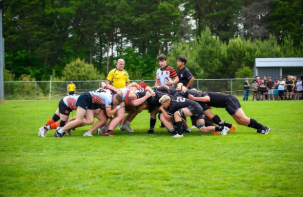On a recent Thursday night, Jr. Elizabeth Snider sprinted 62 feet directly at the vault apparatus. She hurtled and sprung off the board, launching herself into the air. Her hands hit the table and she pushed off, doing a double backflip through the air. Her feet hit the mat as she squeezed every muscle in her body, working hard to stick the landing and keep the skill controlled. Then she did it again. And again. And again. Last year her effort and dedication paid off. She placed in the top ten at both state and regionals in the overall competition and within the top three in vault.
Gymnastics is both a physically demanding and an extremely time consuming sport. Every week, Snider spends 20 hours in the gym, and that number goes up during competition season. But, Snider is not one dimensional. She is a gymnast and a top-notch student, challenging herself with multiple AP and IB classes. As with gymnastics, Snider has always pushed herself with academics. This rigorous course load includes a lot of homework and studying. So how does she manage her busy schedule?
For Snider, the key to achieving success in both gymnastics and school is time management. She is skilled at planning in advance so she can maintain and balance her priorities.
The most important lesson Snider has learned is to never procrastinate. “I don’t procrastinate ever, and that’s not really a problem for me.”
Having a packed schedule has forced her to use all her time wisely. Not only does she have to get her work done, but she also needs to work ahead whenever possible. During school, Snider takes full advantage of extra class time and seminar time because even doing five minutes of work at the end of class instead of packing up early can help. “I’ve been using seminar a lot more and in class, if I know that I’ll have extra time then I’ll definitely try to get stuff done for other classes versus messing around on my Chromebook or being on my phone.”
Snider also takes advantage of weekends and Wednesday nights, her one week night off from practice. During these times she tries to work ahead and get the majority of her homework done, even if the assignment is not due for several days. By working ahead and not procrastinating, Snider has control over her workload on the busy nights.
During competition season, managing time becomes even more challenging, as most weekends are spent at meets, but Snider still makes it work. During these months, time management is even more critical. “When competitions are farther away you just kind of have to make due and work on stuff in the hotel and car.” Often the conditions are not ideal for studying, but with limited time she has learned to adapt. “Last year I went to Ohio for a meet and it was a five hour drive both ways and me and Alyssa, my teammate, we were just typing essays in the car the whole time, and even though it’s not the best situation, you’ve just got to get stuff done.”
Another helpful strategy Snider uses to manage her time is to make a plan. She organizes her homework schedule and creates a clear goal of all she needs to accomplish in one night. For example, on Wednesdays when Snider has substantial amounts of work, she creates a clear-cut schedule. “On Wednesday I don’t get home and immediately start homework, I leave about an hour, hour and a half, and then I make a schedule like I’m going to do physics within the hour before dinner, then I’m going to start doing calculus, so I can usually control it pretty well on days where I have extra time.”
Creating a schedule also contributes to Snider’s ability to stay on task and avoid distraction. She uses the same strategy on weekends, creating a plan for all she needs to get done and prepared for the week ahead. “Over the weekend if I have psychology notes that I know I’m going to have over the week, I’ll get them done earlier, then I don’t get behind.” Snider goes on to say, “When I have days where I have practice and I only have an hour to do homework then I’ll be able to have that stuff done ahead of time.”
Finally, Snider manages her hectic schedule by creating balance through communicating with her parents and coaches, keeping her priorities straight, and being okay with letting a few responsibilities go.
Through regular communication with her parents and coaches, Snider keeps the stress level under control. “If I’m really stressed out they can help me say it’s too much and you need to give something up.” If Snider could do it all, she would, but there simply is not time, so having good communication with her parents and coaches helps her figure when she needs to alter her schedule.
Another important factor in keeping her life balanced is to remember her priorities. While competing and improving in sports is fun, Snider realizes school is her top priority. “School always comes first.” Sometimes making school the top priority means she needs to miss a practice or two which may not be ideal, but in the long run, her academics are more important to her.
Finally, Snider has learned to keep a balance; she needs to let the little things go and realize she cannot always be perfect. “I think there will always be some stressful times, especially during meet season, but over time I’ve kind of learned to control that and know it’s ok to not be at practice all the time.” With a schedule as busy as Snider’s, there will be times where she has too much to do and not enough time to do it. In those times, being realistic and recognizing it is alright to let some things go relieves a great deal of stress.
Priorities, balance, and commitment; the combination of all these things allow Snider to not just be successful, but to enjoy herself in the process.







